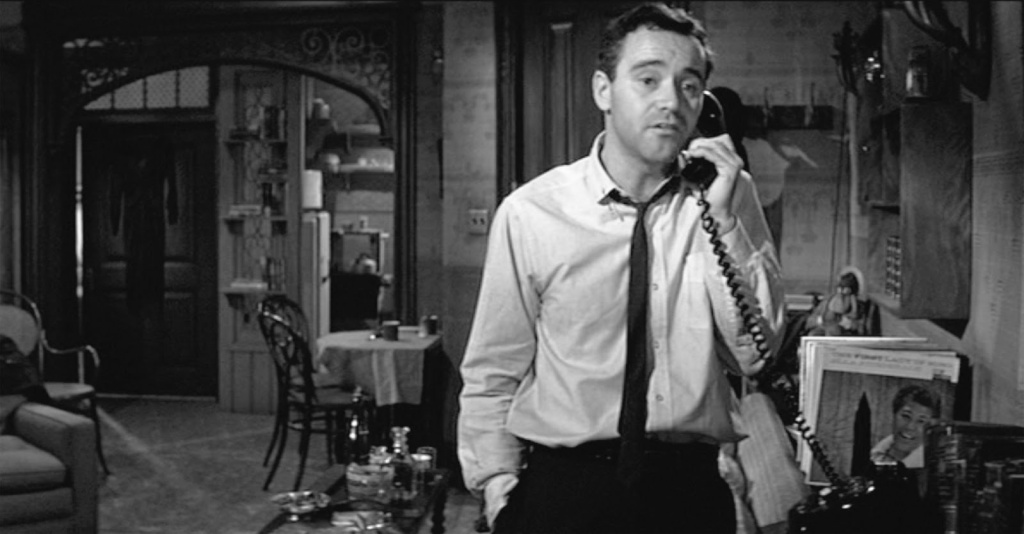When people ask who my favorite fictional characters are, I often receive blank stares when I reply without hesitation: C. C. Baxter. The Apartment (1960) has become a classic in the Billy Wilder canon, but even if those in the conversation know who Jack Lemmon’s C. C. Baxter is offhand, they also know he isn’t exactly an aspirational character. As with almost everyone in Billy Wilder’s masterpiece of post war disillusionment, Baxter is miserable much of the time and somewhat broken. He lets people take advantage of him and he has no real friends. Plot wise, Baxter is an office worker who allows his bosses to use his apartment for their extramarital affairs in exchange for promotions and pay raises at work. He has a good heart, but his fatal flaw is his inability to say “no” despite the consequences that himself and others face. He is empathetic, but he loses himself in his work just enough to forget how much he has been hurt and how his complaisance might be hurting others. He appears enthusiastic, but also doesn’t seem to care too much about anything. Everything is a contradiction, even the tone of the film which is at once a light romantic comedy and a dark melodrama. These contradictions in tone, genre, and character details only make the film more realistic and more relatable in a time when movies were usually made to escape from reality.
The Apartment opens at Baxter’s insurance firm, humorously named Consolidated Life. This opening scene mentions many numbers: Baxter’s desk number, the number of people in New York City, the number of employees at his company, his monthly rent, and the times he can leave his desk. At first glance, Baxter is a willing participant in the machine of this corporation, a small number in the cogs of the system doing whatever it takes to climb the corporate ladder and happy to do so. Jack Lemmon’s head bobbing to the beat of the typewriter and the happiness in his narration lead the audience to expect a light-hearted corporate romp. However, the depression and melancholic tone just below the surface become evident as Baxter goes home to an empty apartment and cleans up the recent messes of his co-workers. He heats up a frozen dinner and turns on his television, sitting in anticipation as an announcer sets up the film Grand Hotel only to segue to an advertisement. Every other channel shows war and violence until he circles back to Grand Hotel. Just before the film starts, another ad interrupts. Giving up, he finishes his dinner in lonely silence and drugs himself to sleep before being awoken by another boss threatening his job for use of the apartment. With minimal protest, he gives up his sleep and wanders Central Park all night, eventually resting on a bench in the cold. This scene shows that Baxter has no direction other than working, paying his bills and sleeping. Everything is a routine and his personal freedoms are often sacrificed to play the corporate game. The corporate sponsors and violent westerns on every other channel are a little funny at first glance but quickly become a larger symbol of the broken post-war consumer culture that runs through the film.
Baxter has a crush on Fran Kubelick (played by Shirley MacLaine), the elevator operator at his office building. Unbeknownst to him, Fran is having an affair with their boss Mr. Sheldrake (played by Fred MacMurray) who recently started taking her to Baxter’s apartment. At an office Christmas party, Baxter realizes Kubelick is the one having an affair with Sheldrake and his face darkens. Even looking at one of the men he’s been sharing his key with disgusts him. He was disconnected just enough to not think about the harm the whole arrangement could cause and that disconnect crumbles knowing someone he cares about has been brought there. He goes out drinking, and at the same time Kubelick meets Sheldrake again at the apartment, still unaware of its owner. Sheldrake refuses to divorce his wife despite his previous promises and drops a one-hundred-dollar bill in her lap when she cries, oblivious to her feelings. Feeling cheap and dejected, at the depths of her despair, Kubelick attempts suicide and Baxter returns home to find her in his bed with an empty pill bottle nearby. His neighbour happens to be a doctor, so they pump her stomach and save her life.
No longer the faux happy go lucky yes man of the first half of the film, Baxter hides his sharp objects and pills, nursing Kubelick back to health for forty-eight hours regardless of consequences from missing work. He even reveals that he had been in a similar situation. He was in love with a married woman, his best friend’s wife. In a moment of desperation, he tried to kill himself too but desperately failed, instead shooting himself in the knee. The depth of Baxter’s depression and feeling are revealed in that moment. The audience realizes he isn’t so different from the women who have been taken to his apartment for affairs. His choices, or lack of choices, are put into a larger context of depression and the apathy he has developed to get through it. He is a symbol of the depression and discontent of the post-war consumerist culture – a depression that has been passed on to my generation as we try to make sense of the world around us and our place in it beyond our paycheck and productivity in the workforce.
All of this adds up to the idea that normal everyday people struggle with depression and suicidal idealisation. The Apartment isn’t an over-dramatic melodrama about someone sent to an asylum or a “psycho” thriller that makes fun of mental illness. This is a film about sad directionless people doing simple everyday things in an imperfect world. They hide the depth of their depression with enthusiasm or a smile. As someone who is clinically depressed and has witnessed a lot of death at the hands of discontent, the imperfection of The Apartment is comforting. It reminds me that I’m not alone, I’m not the only one who can laugh at the absurdity in sad situations and I’m not the only one who has lost people to suicide. I relate to C. C. Baxter on a deeper level than most characters I’ve watched or read. I didn’t know why for the longest time, but I can only attribute it to his nonchalant despair. He lives his life the way I have, half-heartedly surviving any way he can in a world that he doesn’t know how to make sense of. Somehow, The Apartment always makes me feel both less alone and a little melancholic, slightly uncomfortable but ultimately comforting. Once again, these are contradictions that echo in every aspect of the plot. Still, whenever I’m upset, when I feel hurt or alone, I always come back to this film.


Leave a comment